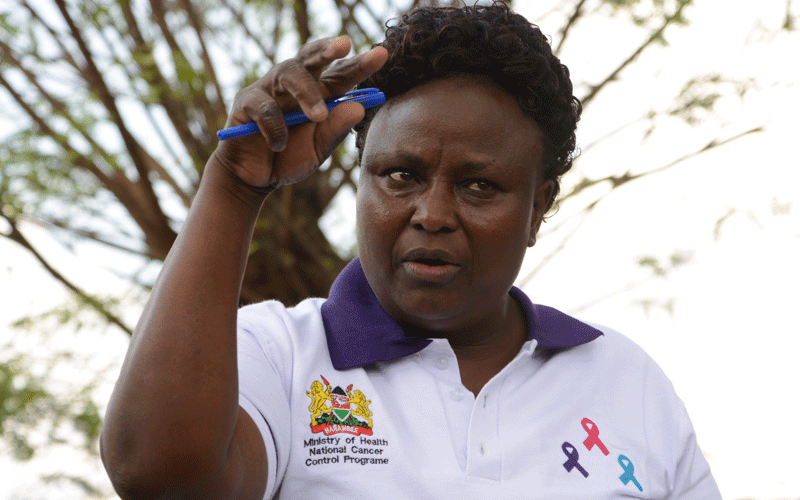Nurse’s mission to help cancer patients
By Bernard Gitau, October 16, 2020Bernard Gitau @benagitau
When people talk about cancer, Margaret Wanjiru understands the impact it can have on a family as she has watched five close family members die from the disease.
Despite the anguish of watching a loved one waste away from cancer, Wanjiru has for the last eight years made it her mission to offer those in the final stages of cancer, care and support.
Her work as a palliative care nurse at Kenyatta National Hospital, Cancer Treatment Centre is more than just a job-it is her way of giving hope and dignity to patients with terminal illness to maintain physical, mental, and emotional health.
“It takes time to understand the needs of each patient in order to provide a customised treatment plan that provides lasting relief,” Wanjiru said.
Resolve
Wanjiru has handled hundreds of cancer patients, some of whom have succumbed to the disease while others conquered it.
Her personal battle with the disease after losing five close family members has strengthened her resolve to offer hope to others.
“I have lost my mother, step mother and three close relatives. Right now my elder sister is at home battling breast cancer,” Wanjiru revealed.
As the country marks Breast Cancer Awareness Month, to her patients, she is a pillar and source of hope but deep down her heart, their pain and struggle sometimes consumes her.
“Initially I was a general nurse for almost four years, but after losing my mother to cancer and other relatives who were in excruciating pain, I took the step of enrolling for Palliative Care Nurse at Kenya Medical Training College (KMTC),” she said.
Wanjiru said the move was aimed at learning the skills of better managing the patients and offering training and awareness to family members and the community at large.
With the Ministry of Health data showing at least 5,900 Kenyans are diagnosed with breast cancer annually and at least 47,000 total cases of cancer and 32,000 deaths are reported annually, Wanjiru says those numbers represent people who have left a gap in their families and other spheres of life.
Claimed life
“Cancer impacts one’s relationship as well. A family member’s severe illness stretches the emotional resources of the rest of the immediate and extended family. I have personal experience,” she said.
Both the person with cancer and loved ones may need to protect one another from their own emotions.
She recalled how cancer has ravaged her family 18 years after it first claimed the life of her brother-in-law.
“We are two families as my father has two wives. My brother-in-law was diagnosed with Oesophagus cancer in 2002 and within two months, he was no more as it was at stage four,” said Wanjiru.
Wanjiru added the disease came calling again a year later, this time claiming the life of her step-mother.
“She was diagnosed with liver cancer at stage four and she didn’t survive,” she said.
After her mother-in-law succumbed to cancer, her aunt was diagnosed with cervical cancer and as she was going on with her radiotherapy, she died.
“Nine years later, my mother was diagnosed with liver cancer after an ultrasound. Unfortunately, she died after one month. I was in pain, anguish and confusion,” Wanjiru said.
After her mother died, she decided to go back to Kenya Medical Training College to undertake Palliative Care training in 2012.
“After the death of my mother, another brother-in-law was diagnosed with oesophagus cancer. A month later he was no more,” Wanjiru said, fighting back tears.
Even as she battled the disease at home, she never relented in offering palliative care services to patients at Kenyatta National Hospital.
“I counsel myself and my belief in God has helped me to remain strong for everyone, especially my patients,” she said.
Wanjiru urged everyone to give cancer patients a friendly smile and after Covid-19 a friendly hand squeeze or hug as it can go a long way.
“Send a card, note or text to say you’re thinking of them. Let them know that if they want to talk you’ll be there to listen – then make sure you are available. Respect their need for privacy,” she added.
In her line of duty, most think palliative care means death but to her it’s not.
“Palliative care does serve many people with life-threatening or terminal illnesses but palliative care also helps patients stay on track with their health care goals,” she said.
According to Wanjiru, lack of enough cancer centres, cancer specialists across the country remains the biggest risk to the Kenyan population.
“Cancer is not a result of witchcraft. Its hereditary, can be caused by lifestyle especially to heavy smoking, alcoholism, among many other causes,” she said.
